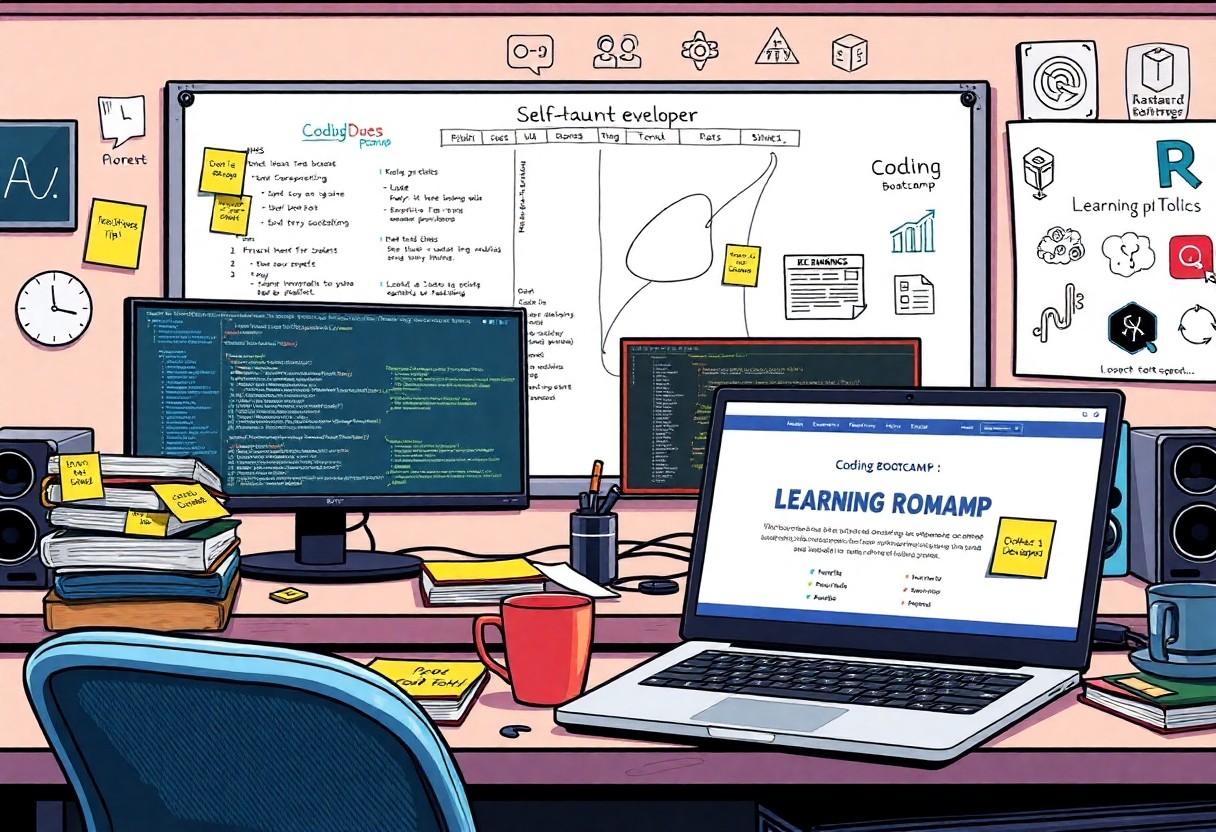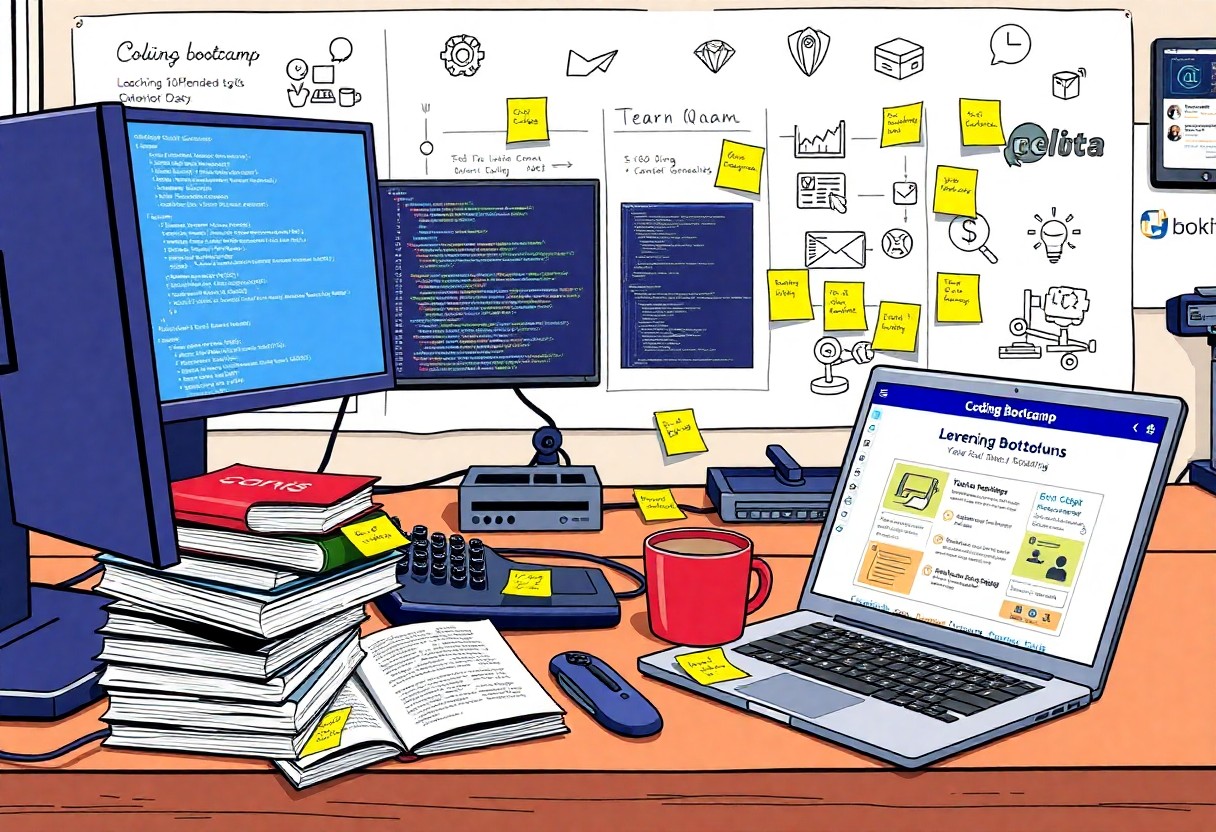Over the next few years, I’ll guide you through my journey to becoming a self-taught software developer and share the important steps you need to take. In 2024, the tech landscape is rapidly evolving, and I want you to leverage the best resources available. Consistent practice and networking with other developers are key to your success. With a focused approach, you can harness your passion for coding and transform it into a rewarding career in software development.

Key Takeaways:
- Focus on foundational programming languages such as Python, JavaScript, or Java to build a solid skill set.
- Utilize online resources, such as coding bootcamps, MOOCs, and open-source projects, to enhance learning and gain practical experience.
- Engage with developer communities through forums and social media to network, seek mentorship, and stay updated on industry trends.
Understanding the Software Development Landscape
As a self-taught software developer, grasping the broader software development landscape is imperative for success. The ecosystem is vast, encompassing various methodologies, tools, and industry trends that will shape your learning path. By familiarizing myself with popular frameworks, emerging technologies, and best practices, I can better position myself in a competitive job market. Knowing where to focus my efforts enables me to tailor my skills to fit the evolving needs of employers and clients alike.
Key Programming Languages to Learn
Focusing on Python, JavaScript, and Java will provide me with a versatile toolkit as I examine software development. Python’s readability, JavaScript’s ubiquity in web development, and Java’s stability in enterprise applications are all valuable. Learning these languages not only enhances my problem-solving skills but also opens doors to various job opportunities in different sectors.
Current Market Trends and Demands
The demand for software developers continues to grow, with particular interest in data science, artificial intelligence, and cloud computing. Industry reports indicate that by 2025, the number of software development jobs is projected to increase by 22%, aligning with a surge in digital transformation initiatives. As businesses shift online, companies seek developers who can create scalable, efficient, and user-friendly applications. Recognizing and adapting to these trends will be integral to my strategy as I build my career.
With the rise of remote work, geographic barriers are diminishing, allowing me to find opportunities across various regions and markets. The increasing reliance on cloud technologies has amplified demand for developers skilled in platforms like AWS and Azure. Furthermore, there’s a growing emphasis on cybersecurity, with organizations searching for developers who can enhance their security posture. By staying informed about these trends, I can align my skills to meet the evolving expectations of employers, ultimately driving my career forward.
Learning Resources and Tools
Utilizing the right resources and tools can significantly enhance your journey as a self-taught software developer. A combination of structured learning and practical applications is key. Explore diverse formats that not only teach you the theory but also allow for hands-on practice, making the learning process dynamic and effective.
Online Courses and Platforms
Platforms like Coursera, Udemy, and edX offer numerous online courses tailored to various programming languages and frameworks. Many of these courses are developed by established universities and industry leaders, providing both flexibility and depth in learning. You can start with beginner courses and progress to more advanced topics at your own pace.
Books and Documentation
Books and official documentation provide insight into foundational concepts and best practices in software development. O’Reilly and Packt Publishing administer a wide range of titles focusing on different programming languages and methodologies. Reading how-tos and best practice guides can fortify your understanding and keep you updated with industry standards.
Delving into books and documentation deepens my comprehension of both basic and complex subjects, providing a solid theoretical foundation. Titles such as “Clean Code” by Robert C. Martin and “You Don’t Know JS” by Kyle Simpson sharpen my techniques and thought processes. Official documentation from languages like Python, Java, or JavaScript is invaluable as it also reflects the most accurate and updated information, ensuring I’m learning current practices and tools. Balancing texts with real-world application solidifies my skills and keeps my knowledge relevant.
Developing a Learning Plan
Creating a structured learning plan transforms a chaotic approach into targeted skill acquisition. By outlining specific paths and resources, I can ensure that each step of my journey is purposeful. Assessing my current knowledge and identifying skills gaps allows me to prioritize topics that matter most, breaking complex subjects into manageable modules for better retention and application.
Setting Goals and Milestones
Establishing clear, achievable goals and milestones acts as a roadmap for my learning journey. I define both short-term goals, such as completing an online course or mastering a specific programming concept, and long-term milestones like building a complex project or contributing to open-source. This method not only keeps me motivated but also provides me with a sense of accomplishment as I progress.
Creating a Study Schedule
A well-structured study schedule enhances my productivity and learning consistency. By allocating specific time blocks each week to focus exclusively on coding and related topics, I create a routine that becomes a habit. I find the Pomodoro Technique effective, allowing me to concentrate for 25 minutes followed by a 5-minute break, ensuring I remain engaged while absorbing new information without burnout.
Building a study schedule should consider my personal commitments and peak productivity times. I allocate more difficult topics to when I am most alert and energetic, whether that’s early morning or late evening. Tools like digital calendars or task management apps help me track my progress and reschedule if necessary. This structure fosters discipline and keeps my motivation high, making the learning process enjoyable and effective.
Building Practical Skills
Mastering software development requires more than theory; it demands practical skills. Building these skills involves immersive, hands-on experiences that reinforce what I’ve learned and help to solidify my knowledge. Engaging in real-world challenges prepares you for the unexpected issues that arise in coding and problem-solving, creating a robust foundation for your programming career.
Working on Personal Projects
Creating personal projects is an excellent way to apply your skills while pursuing your interests. By developing apps, websites, or tools that solve real problems, I can refine my coding abilities and gain insight into user needs. Each project becomes a portfolio piece showcasing my work and growth as a developer.
Contributing to Open Source
Contributing to open source projects allows me to collaborate with experienced developers and engage with a broader community. I practice coding in diverse environments, often gaining exposure to advanced concepts and different coding standards. This collaboration not only enhances my skills but also builds professional connections that can lead to job opportunities or mentorship.
Open source platforms, such as GitHub, host countless projects that welcome contributions, ranging from small bug fixes to major feature implementations. I often start by exploring issues labeled “good first issue” or “help wanted,” which helps ease my transition into larger, more complex projects. Through collaboration, I learn how to navigate codebases and improve code quality with valuable feedback from peers. Each contribution enhances my resume and demonstrates my commitment to growth in the software development field, potentially leading to professional recognition and job offers.
Networking and Community Engagement
Building connections within the tech ecosystem enhances your learning experience and opens doors to opportunities. By engaging with others, you expand your perspectives, gain insights, and perhaps find collaborators for projects. Effective networking can lead to job opportunities, mentorships, and feedback that guides your growth as a software developer.
Joining Developer Communities
Participating in developer communities allows you to share knowledge and gain support. Online platforms like GitHub, Reddit, and Discord host vibrant groups where you can ask questions, learn from others, and showcase your work. Engaging actively in these environments enables you to network with peers and industry veterans, fostering invaluable connections.
Attending Conferences and Meetups
Attending conferences and meetups exposes you to industry trends, expert insights, and networking opportunities. Opportunities to engage with fellow developers, tech leaders, and potential employers abound at these events. The exchange of ideas and experiences fuels your growth, providing motivation and deeper understanding of the field.
Researching and selecting relevant conferences can profoundly impact your development journey. For instance, events like QCon or DevOpsDays attract a diverse array of professionals eager to share their knowledge. These gatherings often feature workshops, panels, and discussion forums, yielding exposure to both cutting-edge technologies and industry best practices. Networking at these events can lead to partnerships or mentorships that significantly enhance your career trajectory.
Staying Motivated and Overcoming Challenges
Persistence in learning is imperative for long-term success. I often face obstacles like boredom or fear of inadequacy, so developing strategies to stay motivated is key. Setting achievable goals, tracking my progress, and celebrating small wins keeps me engaged. Connecting with a community of like-minded learners can provide additional support and encouragement, making the journey less daunting.
Tips for Keeping Focused
To maintain focus, I recommend establishing a consistent routine, breaking down tasks into manageable chunks, and minimizing distractions.
- Create a dedicated workspace
- Use time management techniques like the Pomodoro Technique
- Set specific learning goals
- Engage with online coding communities
Recognizing these strategies help build discipline and ensure steady progress.
Managing Learning Fatigue
Learning fatigue often strikes when the material feels overwhelming or monotonous. Taking regular breaks and mixing up the learning formats can rejuvenate my enthusiasm. Incorporating different resources like videos, podcasts, and interactive coding exercises prevents my routine from becoming stale, which in turn enhances retention and engagement.
Managing learning fatigue effectively involves incorporating balance into your study routine. I recommend scheduling regular breaks to avoid burnout, such as a 5-minute break after 25 minutes of studying. Alternate between different learning styles, such as reading coding documentation one day and watching tutorial videos the next. Engaging in hands-on projects not only reinforces concepts but also keeps learning fresh and exciting. Taking time to reflect on your progress and excitement about future goals can reinvigorate your passion for development. Prioritizing mental well-being is imperative for sustained growth in your software development journey.
Final Words
Now, as I reflect on my journey to becoming a self-taught software developer in 2024, I realize the importance of consistent learning, hands-on practice, and engaging with the tech community. You can accelerate your growth by choosing the right resources and dedicating time each day to code. Leveraging platforms like online courses, forums, and projects will empower you to build a portfolio and network with peers. Embrace challenges as opportunities, and stay committed to your learning path; your dedication will pave the way for a successful career in software development.
FAQ
Q: What are the imperative skills needed to become a self-taught software developer in 2024?
A: The imperative skills include proficiency in programming languages such as Python, JavaScript, or Java, understanding of data structures and algorithms, familiarity with version control systems like Git, and knowledge of web development frameworks. Additionally, it’s beneficial to have skills in database management, problem-solving, and basic understanding of software development methodologies.
Q: How can I structure my learning path as a self-taught software developer?
A: Start by choosing a programming language and working through tutorials to build basic projects. Progress to more complex topics such as frameworks and libraries. Incorporate online courses, coding challenges, and open-source contributions. Set specific goals, create a timetable, and periodically review your progress to adapt your learning path as needed.
Q: What resources are available for self-taught software developers in 2024?
A: Resources include online platforms like Codecademy, freeCodeCamp, and Coursera for structured courses. YouTube offers free tutorials, while GitHub provides access to open-source projects. Join online communities such as Stack Overflow or Reddit for support and networking. Additionally, coding bootcamps can offer intensive learning experiences and mentoring.
